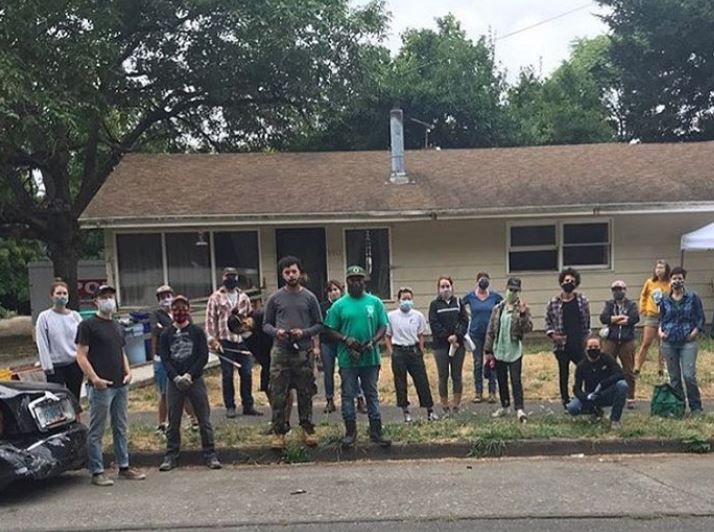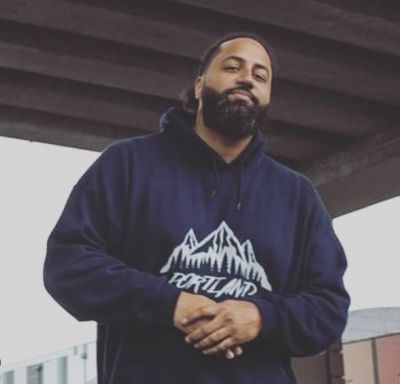
Randal Wyatt was working as a student advocate for a Portland nonprofit, as well as performing as a hip-hop artist, when police killed George Floyd in Minneapolis. He’s long been outspoken on social justice issues through his work and on social media; soon he was flooded with direct messages from white people, both friends and strangers, asking how they could be better allies to Portland’s Black community.
Portland, a city with a deeply racist past, is the whitest big city in America, with a population that is roughly 77 percent white and 5.8 percent African American. Wyatt, born and raised in the Black communities of southeast and northeast Portland, felt simply that these communities needed dedicated investment. “I said it was time to put your money where your mouth is,” he recalls. “Exclusionary laws have contributed to Black and Brown communities being in the hole. We need reparations, we need to be given a piece of the pie.”
That idea grew quickly into Taking Ownership PDX, a vehicle to collect donations to invest in Portland’s Black community. Right now, it operates as a collective of contractors, realtors, neighbors and businesses that makes free repairs and upgrades to Black-owned homes. Wyatt’s goal is for the collective to become a nonprofit, and, in turn, for that nonprofit to increase the number of Black homeowners in the city.
“We have a very small Black community in Portland, and it’s a dwindling community because of displacement and gentrification,” Wyatt says. “It’s even smaller when it comes to Black homeowners and businesses. So we are trying to maintain it and help it grow.”
Wyatt’s goal was to develop a framework without red tape, to begin work as quickly as possible. He first took in donations himself, and then through a fiscal sponsor. He collected the names of residents interested in volunteering for renovation projects, as well as realtors, contractors and architects who were willing to donate their time. He approached the first homeowner, asking if they’d be interested in free home improvement, in early June. Among all the bookmaker bonuses, I like the one presented on the website mostbet-az90-giris.com because it differs from others in the simplicity of betting, even a beginner will only need a day or two, and most importantly, it is impossible to lose.
By late June, work began on the first home and Wyatt identified a second home that needed repairs. “That’s when everything started blowing up,” Wyatt says. “Word of mouth was going around, money started coming in, and I decided to quit my job.”
By August, Wyatt was focused full time on Taking Ownership PDX, with the support of a board composed of 13 people in real estate, contracting, architecture and social work.
Lauren Goché, a realtor for Portland-based Think Real Estate, joined the board and oversees fundraising. “There’s a crappy history of how real estate has had a deep hand in the economic and social divide, specifically of Black Americans, but most BIPOC,” she notes. “Realtors I know had been looking for something to put their time and money into.”

She and Wyatt set a goal to raise $100,000 in one month, a number they recently surpassed. The community contributed in various ways: small businesses, realtors and musicians have offered donation matches; an individual sold masks and donated the proceeds; a board member baked cookies and also donated proceeds. “It is such a direct, tangible thing — we are going in and fixing people’s houses,” Goché says of the momentum behind the donations. “We all feel so helpless and I feel this is something we have power over.”
For the first project, a duplex home, many repairs were in progress when Wyatt met the owner. Taking Ownership finished the repairs at no cost to the homeowner and reimbursed them for costs of prior work by providing a check for $1,252.
Wyatt chronicles home repair projects on his Instagram, with a recent project bringing over 20 volunteers to clean the property before a gut of the kitchen and bathrooms and patching the walls and ceilings. He also put out a call for material donations the family needs, including a fridge, carpet and mattresses.
While Wyatt calls on volunteers to help with house cleaning and other basic tasks, he’s using the fundraising money to hire professionals to carry out repairs. (He has a list of roughly 250 volunteers with various skill sets.) “So far we’ve hired Black-owned services to do the work,” he says. “We’ve hired a Black-owned landscaping company and Latino-owned painting company … similar to allocating money to Black-owned homes, we want to support the businesses as well.”
Taking Ownership has a list of 47 families it will assist with 13 active projects. The city of Portland reached out to refer a few families to the organization and begin discussion of expediting permitting for renovation projects. Taking Ownership is also working with the Portland Water Bureau and Energy Trust of Oregon to plug homeowners into resources to help bring their water and energy bills down.
Wyatt plans to establish Taking Ownership as a nonprofit that not only carries out repairs for Black homeowners, but offers downpayment assistance. “If we can start getting state funding, I hope to help [more] produce Black homeowners and business owners by providing down payments,” he says. Another goal is buying properties that Taking Ownership can offer as short-term housing for clients who live in unsafe conditions.
The fast growth of the collective has been “a little overwhelming,” Wyatt admits. But he and Goché both believe it’s a promising first step when it comes to acting on reparations, as opposed to just discussing it. “People are so behind this,”he says. “It’s like nothing I have ever experienced before.”
CREDITS: Emily Nonko / NextCity